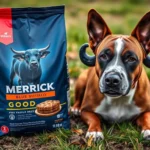
Introduction
Labradoodles are a popular crossbreed, combining the playful nature of the Labrador Retriever with the intelligence and hypoallergenic qualities of the Poodle. These dogs are not only known for their friendly temperament but also for their unique appearance, often sporting a wavy or curly coat. As a hybrid breed, Labradoodles can inherit varying traits from their parent breeds, which can influence their overall health and nutritional needs.
Proper nutrition is crucial for Labradoodles. It significantly affects their health, energy levels, and coat quality. A well-balanced diet can help prevent common health issues that Labradoodles face, ensuring a long and happy life for your furry friend.
Understanding Labradoodle Nutritional Needs
Nutritional Requirements
Like all dogs, Labradoodles require a balanced diet that includes essential nutrients: proteins, fats, carbohydrates, vitamins, and minerals.
-
Proteins: They are the building blocks of a dog’s body, necessary for muscle development and immune function. Look for high-quality protein sources in dog food, such as chicken, beef, or fish.
-
Fats: Healthy fats provide energy and support skin and coat health. Omega fatty acids, particularly, are vital for maintaining a Labradoodle’s beautiful coat.
-
Carbohydrates: While dogs don’t need carbs as much as humans, they do provide energy. Opt for whole grains or legumes as a source of digestible carbohydrates.
-
Vitamins and Minerals: These micronutrients are essential for various bodily functions. Ensure the dog food you choose is fortified with the necessary vitamins and minerals.
Daily caloric intake for Labradoodles varies based on their age, weight, and activity level. On average, an adult Labradoodle may require between 1,000 to 1,500 calories per day. Puppies and active adults may need more, while older or less active Labradoodles may need fewer calories to maintain a healthy weight.
Common Health Issues in Labradoodles
Labradoodles can be prone to several health issues, including hip dysplasia, allergies, and certain skin conditions. These concerns highlight the importance of a specialized diet. For example, dogs with hip dysplasia may benefit from foods rich in glucosamine and omega fatty acids, while those with allergies might require a limited ingredient diet.
Types of Dog Food Available
Dry Dog Food (Kibble)
Dry dog food, or kibble, is one of the most common types of dog food.
Benefits:
– Convenient and easy to store
– Helps in dental health by reducing plaque buildup
Drawbacks:
– May contain fillers or low-quality ingredients if not chosen carefully
When selecting kibble for Labradoodles, look for high-quality brands that list real meat as the first ingredient and avoid artificial preservatives.
Wet Dog Food
Wet dog food is another option that many pet owners consider.
Benefits:
– Higher moisture content, which can help with hydration
– Often more palatable for picky eaters
Drawbacks:
– Typically more expensive than dry food
– Can spoil quickly once opened
Wet food may be more suitable for Labradoodles with dental issues or those who need encouragement to eat.
Raw Diet
A raw diet consists of unprocessed foods, including raw meat, bones, fruits, and vegetables.
Pros:
– Can lead to healthier skin and coat
– Some owners report improved energy levels
Cons:
– Requires careful planning to ensure balanced nutrition
– Risk of bacterial contamination if not handled properly
If considering a raw diet for your Labradoodle, consult with your veterinarian for guidelines.
Homemade Dog Food
Preparing homemade dog food can be a rewarding option for pet owners.
Guidelines:
– Ensure meals are balanced with proteins, carbohydrates, fats, vitamins, and minerals.
– Avoid harmful ingredients like onions, garlic, and chocolate.
Homemade diets can be tailored to meet the specific needs of your Labradoodle, but it requires careful planning and knowledge of canine nutrition.
Top Ingredients to Look For
High-Quality Proteins
Selecting dog foods with high-quality proteins is crucial for maintaining your Labradoodle’s health. Look for ingredients like:
- Chicken
- Beef
- Fish
- Lamb
These real meat sources provide the essential amino acids necessary for muscle development and overall health.
Healthy Fats
Healthy fats, particularly omega fatty acids, play a significant role in maintaining coat health and reducing inflammation. Recommended sources of healthy fats include:
- Fish oil
- Flaxseed oil
- Chicken fat
Including these in your Labradoodle’s diet can enhance their coat quality and support skin health.
Whole Grains vs. Grain-Free
The debate between whole grains and grain-free diets continues among dog owners.
Whole Grains:
– Provide fiber and essential nutrients
– Can be beneficial for digestion
Grain-Free:
– May be necessary for dogs with specific grain allergies
– Often contains alternative carbohydrate sources like sweet potatoes or peas
When considering a grain-free diet, ensure that the food still contains adequate protein and other nutrients.
Fruits and Vegetables
Incorporating fruits and vegetables into your Labradoodle’s diet can offer various health benefits. Safe options include:
- Carrots
- Green beans
- Blueberries
- Apples (without seeds)
These can provide vitamins, minerals, and antioxidants that contribute to overall health.
The Best Dog Foods for Labradoodles
Top Commercial Brands
Choosing the best dog foods for Labradoodles involves considering various commercial brands known for their quality.
- Brand A:
- Key Features: High protein content from real meat, grain-free options.
- Pros: Great for sensitive stomachs, well-balanced nutrients.
-
Cons: Higher price point.
-
Brand B:
- Key Features: Includes omega fatty acids for skin and coat health.
- Pros: Affordable, easily digestible.
-
Cons: Some formulas may contain fillers.
-
Brand C:
- Key Features: Limited ingredient formulas for dogs with allergies.
- Pros: Reduces allergy symptoms, highly palatable.
-
Cons: Limited variety in flavors.
-
Brand D:
- Key Features: Focuses on high-quality animal proteins and whole grains.
- Pros: Promotes healthy digestion, supports energy levels.
-
Cons: May not be suitable for all dogs.
-
Brand E:
- Key Features: Specially formulated for large breed puppies.
- Pros: Supports healthy growth and development.
- Cons: Only suitable for puppies.
Budget-Friendly Options
Not everyone can afford premium dog food, but there are many budget-friendly options that still meet the nutritional needs of Labradoodles. Some affordable brands include:
- Brand F: Offers decent protein levels and essential nutrients at a lower price.
- Brand G: Known for its quality ingredients and affordability, making it a great choice for budget-conscious pet owners.
When shopping on a budget, prioritize brands with high-quality ingredients and avoid those with fillers or artificial additives.
Specialty Diets
Labradoodles with specific health issues may require specialized diets. For dogs with allergies, consider brands that offer limited ingredient diets. For those needing weight management, look for formulations designed for reduced calorie intake while still providing essential nutrients.
Transitioning to a New Dog Food
Importance of Gradual Transition
When introducing a new dog food, it’s crucial to do so gradually. This approach helps prevent digestive upset. A good rule of thumb is to transition over a week:
- Days 1-3: Mix 25% new food with 75% old food.
- Days 4-5: Mix 50% new food with 50% old food.
- Days 6-7: Mix 75% new food with 25% old food.
- Day 8 onwards: 100% new food.
Signs of a Good or Bad Reaction
While transitioning, monitor your Labradoodle for any signs of adverse reactions, such as:
- Vomiting
- Diarrhea
- Itchy skin
- Changes in appetite
If any of these symptoms occur, consult your veterinarian for advice on whether to continue with the new food.
Conclusion
Choosing the best dog foods for Labradoodles is essential for their overall health and well-being. A balanced diet tailored to their specific needs can prevent health issues and promote a vibrant, happy life. Always monitor your dog’s health and be prepared to adjust their diet as necessary. Consult with your veterinarian if you have any concerns regarding your Labradoodle’s nutritional needs or health conditions.
Call to Action
We invite you to share your experiences with Labradoodle nutrition in the comments! Your insights can help fellow dog owners make informed choices about their furry companions’ diets. For more tips on dog care and product reviews, consider subscribing to our blog/newsletter.









